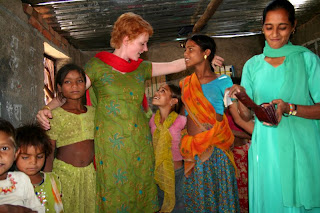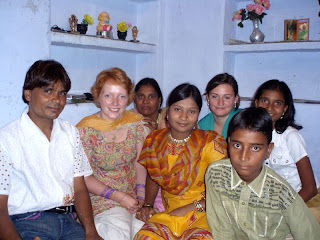The Story of Saura
 Some of this I knew from the extensive family and population survey we've been carrying out since we got here. We walked from house to house and heard the story of each individual family. Our cook and mother-like figure here, Saroji lovingly called Auntyji (the 'ji' signifying the respect we have for her), told me the story of Saura, a less than 2-year old boy who we've been noticing these past weeks. He wanders the village alone with a stick in his hand, stuffing dirt in his mouth and a protruding abdomen like I've never seen before.
Some of this I knew from the extensive family and population survey we've been carrying out since we got here. We walked from house to house and heard the story of each individual family. Our cook and mother-like figure here, Saroji lovingly called Auntyji (the 'ji' signifying the respect we have for her), told me the story of Saura, a less than 2-year old boy who we've been noticing these past weeks. He wanders the village alone with a stick in his hand, stuffing dirt in his mouth and a protruding abdomen like I've never seen before.Saura's mother suffers from tuberculosis and hence left Jarel to spend her last days in the care of her parents in another village. She did not bring Saura since her parents wouldn't be able to take care of them both. Saura was left in the care of his father, who at the age of 26 took a new wife - aged 13. The caretaker of Saura is in reality his grandmother who lives with the family.
Saura's father drinks heavily and is involved in criminal activities such as the illegal liquor production that is the main source of income for the community, and possibly roadside robberies. Thus, these days he's hiding in the jungle far from the village and his responsibility towards Saura. The grandmother has been absent every day since we arrived. Allegedly, she feeds Saura in the morning and leaves to go to the market - possibly selling things, but most probably to beg or steal from unattending shopkeepers.
Last week, on a rare 'visit' to his house, the father beat up his young wife so badly that she left Jarel to go back to her parents. Saura wanders the dusty paths of Jarel in his own little world - not that his stepmother has any sort of duty to take care of him since the father has rejected that responsibility, and the social logic then puts the task in the hands of other family = the grandmother who is also absent. Saura has no one.
 When I picked him up yesterday, he refused eye contact with me and seemed unable to make any sounds at all - not even whimpering, crying or grumpy noises. He sat as a doll on my arm while I tried to reason with the women of the town - with our guide obviously. They argued that he's not their responsibility since he's not their son. I argued that it's not the fault of the child that his mother is dying. They said he's a bad investment because he will grow up and owe his livelihood to his real parents, not the ones that incidentally gave him affection and care. I argued that not all efforts in our lives have to give a reward. I argued that a motherless child is the responsibility of all mothers (I never said I stopped being an idealist, did I...?). Saura sat paralysed through this conversation, as if he was painfully unused to being picked up and held.
When I picked him up yesterday, he refused eye contact with me and seemed unable to make any sounds at all - not even whimpering, crying or grumpy noises. He sat as a doll on my arm while I tried to reason with the women of the town - with our guide obviously. They argued that he's not their responsibility since he's not their son. I argued that it's not the fault of the child that his mother is dying. They said he's a bad investment because he will grow up and owe his livelihood to his real parents, not the ones that incidentally gave him affection and care. I argued that not all efforts in our lives have to give a reward. I argued that a motherless child is the responsibility of all mothers (I never said I stopped being an idealist, did I...?). Saura sat paralysed through this conversation, as if he was painfully unused to being picked up and held.We left the women and took Saura to the water pump where we gave him a thorough wash. Still he didn't make a sound - he whimpered a tiny bit when he got soap in his eyes but not a cry, not a scream. The whole time, he never looked up at us, never once did we catch his eye. I talked to him, asked him questions like you would do to any child of that age and got no reaction from him. When he was all dry, all fresh and clean I carried him to a spot in the sun and held him cradled like an infant for a while as he soaked up the warmth from me and the sun. tickled him a little - and suddenly, he opened his eyes wide, looked up at my face and smiled a crooked and heartfelt smile. As much as his story broke my heart, did that smile restore my faith in humanity. He's not lost for eternity - he's merely 1½ years old and needs affection, laughter and to be touched by a human hand. I promised myself that I will hug him every day until we leave - and I will make one of my older pupils do the same to have him integrated into their games and lives. I asked the women to find him some clothes and after much bickering, they gave him a pair of small pants and a dress. Even in this community it is considered disgraceful to walk around naked - even for children - so it seemed very important to find him something to wear to get him integrated.
Today, I worried that they might have taken the clothes from him again. That someone else needed it. But I happily saw this morning that one of our regular girls brought Saura to school, wearing the dress and a big smile (and a repulsively running nose, but you can't win all your battles, eh...?). Lalita sat him down and Premchand played with him and made sure he was fed when children's services came with lunch for them (something new that we don't exactly know why happens...).
Saura is the ultimate victim of everything endimically problematic about the Kanjari community's existence. He represents everything that we are fighting against. Did we win a victory? Morten told me that the change was visible. Judge for yourselves.


 There's no point in addingup the endless amounts of delicious sweets and interesting salty dishes that were put before us at the home of Rosham, Hamid, Tabasum, Anju and Wasim. All that really matters is that these are truly great people, modest and warm and smiling and friendly - and not pushy as their neighbours were, but calm and down-to-earth about us being white. This might seem like a weird comment but it was a true blessing to be invited into their home so unpretetiously and with such enthusiasm stemming from them liking us, not just finding us interesting. Rosham gave us both bangles, earrings and a Rajasthani scarf as gifts for coming to celebrate Eid with them - and told us that we were her first friends. Nanna and I agreed after the visit that we could now officially call the Tailor family our first Indian friends (apart from our guides and the staff obviously, but they don't count since we didn't have to make an effort to meet them :-)).
There's no point in addingup the endless amounts of delicious sweets and interesting salty dishes that were put before us at the home of Rosham, Hamid, Tabasum, Anju and Wasim. All that really matters is that these are truly great people, modest and warm and smiling and friendly - and not pushy as their neighbours were, but calm and down-to-earth about us being white. This might seem like a weird comment but it was a true blessing to be invited into their home so unpretetiously and with such enthusiasm stemming from them liking us, not just finding us interesting. Rosham gave us both bangles, earrings and a Rajasthani scarf as gifts for coming to celebrate Eid with them - and told us that we were her first friends. Nanna and I agreed after the visit that we could now officially call the Tailor family our first Indian friends (apart from our guides and the staff obviously, but they don't count since we didn't have to make an effort to meet them :-)). 


 The Kanjar Project I'm a part of is their latest invention. The Kanjars, as you might have understood from the previous blogpost, are extremely isolated and marginalised and their social existence is restricted to 16 villages where no 'respectable citizen' ever set their feet. I'm having a hard time describing these villages. Jarel, where I work, has about 40 houses all inhabited by 5-9 persons in about 8-10 square meters. They usually have one bed, a huge barrel for grain and a few pots and pans + a small fireplace made out of cow dung (saw one in the making today, very fascinating). Most of the children here have enlarged abdomens and nightblindness due to lack of vitamins and in general proper nourishment.
The Kanjar Project I'm a part of is their latest invention. The Kanjars, as you might have understood from the previous blogpost, are extremely isolated and marginalised and their social existence is restricted to 16 villages where no 'respectable citizen' ever set their feet. I'm having a hard time describing these villages. Jarel, where I work, has about 40 houses all inhabited by 5-9 persons in about 8-10 square meters. They usually have one bed, a huge barrel for grain and a few pots and pans + a small fireplace made out of cow dung (saw one in the making today, very fascinating). Most of the children here have enlarged abdomens and nightblindness due to lack of vitamins and in general proper nourishment.


